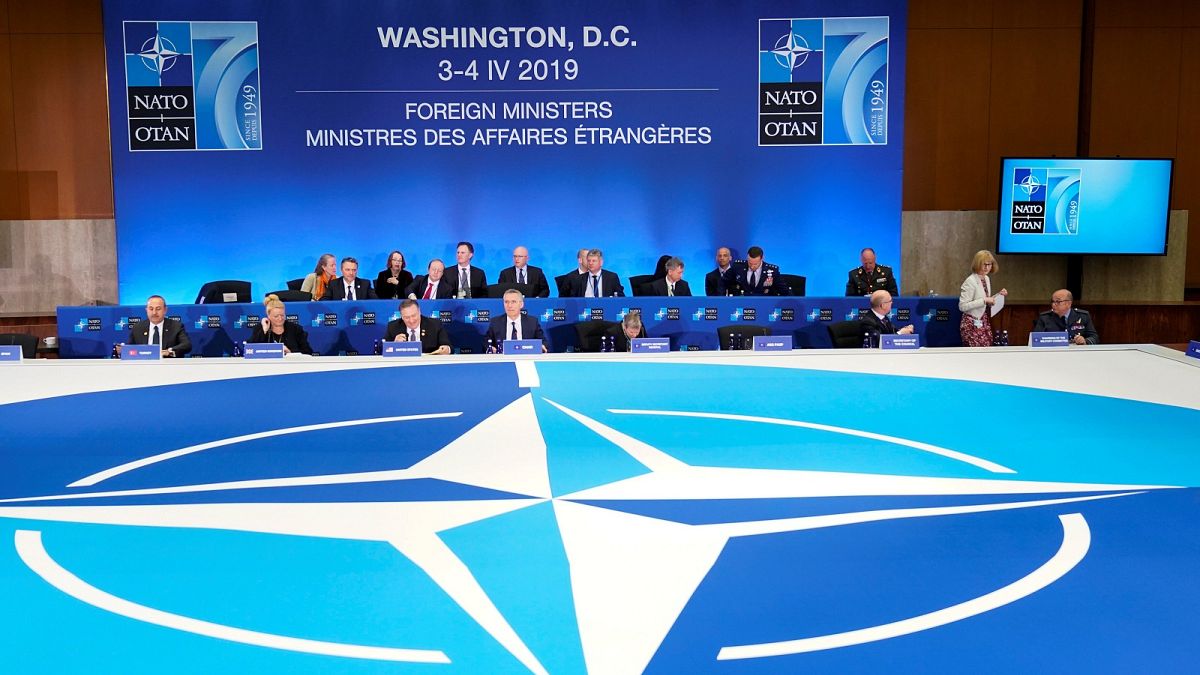NATO has much to celebrate but if the alliance is to survive in the coming decades it has to find ways to adapt to the evolving and emerging threats, and to manage tension in the transatlantic relationship.
NATO’s first Secretary General, Lord Hastings Ismay, famously said the alliance’s purpose was “to keep the Russians out, the Americans in and the Germans down.” As the North Atlantic Treaty Organisation celebrates its 70th birthday, it is still keeping the Russians at bay. But keeping the Americans in has become more of a challenge as Washington becomes more preoccupied with the challenge from China. And the alliance is more concerned now about getting Germany’s defence budget up than keeping it down. A deterioration in relations with Turkey also threatens to upset cohesion in the alliance. In short, NATO is now threatened more by internal problems than external threats.
NATO has been an extraordinarily successful military alliance. It deterred conflict in Europe until its main adversary, the Soviet Union, collapsed. Since then it has welcomed nine former Soviet bloc countries as members, helped international efforts to bring peace to Bosnia and Kosovo, and deployed troops to Afghanistan. Russia’s annexation of Crimea and invasion of Eastern Ukraine in 2014 has seen the alliance pivot back to Europe and a renewed focus on defending its members against attack. NATO still faces myriad external threats; from Russian aggression to the migration crisis in the Middle East and jihadi terrorism. But it’s NATO’s ability to overcome its internal struggles that may pose the biggest challenge for the 29-nation alliance.
Turkey seems almost permanently at odds with its allies. Relations have soured since President Recep Tayyip Erdoğan felt his allies did not offer sufficient support following the coup attempt against him in 2016. The US and Turkey have also fallen out over Ankara’s efforts to extradite Fethullah Gülen, the US-based Islamic cleric whom Erdoğan claims was behind the coup attempt, and over American support for Kurdish fighters in Syria who are affiliated with the Kurdish Workers Party (PKK) in Turkey, widely-regarded as a terrorist organisation. Erdoğan’s plan to buy a Russian S-400 air defence missile system instead of a US one has added fuel to the fire. To make matters worse, the EU has also effectively frozen Turkey’s accession negotiations over human rights and other concerns.
Another serious problem for NATO is Germany’s reluctance to invest in defence. Germany plans to increase defence spending to 1.37% of GDP in 2020, and then cut it to 1.25% by 2023 – well below NATO’s 2 per cent target. Germany’s leadership of NATO’s Very High Readiness Joint Task Force, and its participation in the Baltic air-policing mission and the NATO Battlegroup in Lithuania are important. But internal assessments have shown the low readiness of the German military; with a lack of spare parts, personnel shortages and long maintenance times. Allies are questioning whether Germany can fulfil its commitments.
Germany’s under-investment in defence has contributed to NATO’s biggest internal problem: the negative attitude of the current US administration towards NATO. President Donald Trump has never been a fan of the alliance. He has criticised his European allies for taking advantage of America’s deep pockets and military power. Trump was marginally more positive about the alliance in a meeting with NATO Secretary General Jens Stoltenberg on 3 April. But at a NATO summit in Brussels last year, he threatened America could “go our own way” if allies didn’t stump up more cash, and accused Germany of being controlled by Russia.
He has reportedly toyed with the idea of making countries pay the cost of US forces stationed on their territory, plus 50%. The US is sceptical about the EU’s defence ambitions and its objective of “strategic autonomy,” and Europe’s plans to buy more military equipment domestically instead of from the US could further complicate relations.
The US’s growing preoccupation with the rise of China as an economic, political and military rival also threatens to distance America from its NATO allies. The US is re-orienting its forces towards China, and away from other regions of the world. Some in the US want the Europeans to do more to help the US provide security in regions like South-East Asia and the South China Sea, which are economically more important to Europe than to the US. Europeans are waking up to the security risks of growing Chinese influence in Europe but are still framing competition with China in economic more than in security terms.
NATO’s internal issues are not without solutions. German Chancellor Angela Merkel has said she expects German spending to be higher than the announced numbers - but Berlin will have to follow through. Other European allies have already put their money where their mouths are. NATO’s Secretary General Jens Stoltenberg said on Wednesday that Trump’s demand for more spending was having an impact; Trump was happy to take the credit.
For their part, Americans should accept that European politicians can make the case for bigger defence budgets more easily if they spend taxpayers’ money on European equipment. They should welcome the EU’s ability to add value to defence industrial initiatives, and not let economic competition with Europeans spill over into the alliance. NATO and the EU are already working together on countering ‘hybrid’ challenges such as cyber-attacks and Russian disinformation campaigns.
The European members of the alliance may have a role to play in ensuring that Turkey does not drift completely out of the Western orbit, by maintaining a dialogue with Ankara. Erdogan’s economic problems may offer the Europeans some leverage. And while most European allies have little to offer in terms of a military contribution alongside the Americans in the South China Sea, both sides could benefit from more detailed exchanges over how to deal with China, including by supporting the countries of the Association of Southeast Asian Nations (ASEAN) that dispute Beijing’s South China Sea claims.
NATO has much to celebrate but if the alliance is to survive in the coming decades it has to find ways to adapt to the evolving and emerging threats, and to manage tension in the transatlantic relationship. The Alliance’s 70th birthday is a good time for Americans and Europeans to think creatively about how to keep the alliance spry in its old age.
Sophia Besch is a Berlin-based Research Fellow at the Centre for European Reform
Ian Bond is the Director of Foreign Policy at the Centre for European Reform in London



